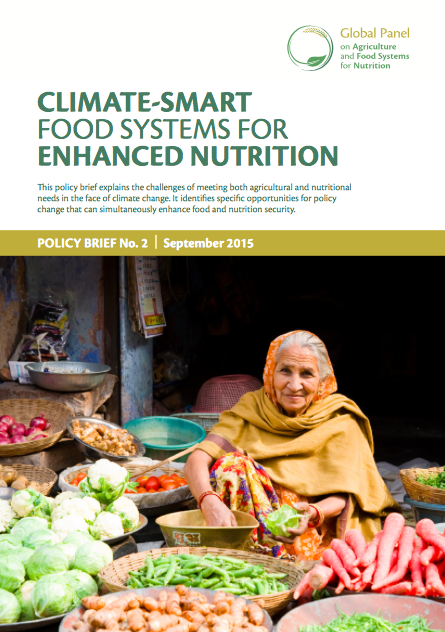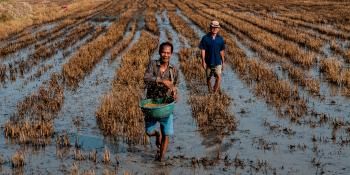Without nutrition security, climate resilience is a myth

Nutrition is the cornerstone on which future food security must be built - have climate negotiators listened?
This year’s Global Nutrition Report of the International Food Policy Research Institute (IFPRI) makes for a grim read: 1.8 billion adults are overweight or obese, while 2 billion experience micronutrient malnutrition.
More than 160 million children under the age of 5 are ‘stunted’, meaning that they are too short for their age and more than 50 million are ‘wasted’ (too lightweight for their age). This is the reality we face in 2015.
At the forefront of addressing these problems is the Global Panel on Agriculture and Food Systems of Nutrition (Global Panel). A policy brief by the Global Panel published earlier this year urged policy action for enhanced nutrition in the face of climate change.
The brief states that "urgent action is required by governments to link food system resilience with higher quality diets and nutrition." It goes on to deliver a list of recommended policy actions. Topping this list is the call to "include diet quality goals within adaptation targets proposed for climate action."
Last week, at the climate negotiations in Paris, the Panel held a side-event on enhanced nutrition, featuring high-level scientists and policymakers.
Among the speakers was James Kinyangi, East Africa Regional Program Leader at the CGIAR Research Program on Climate Change, Agriculture and Food Security (CCAFS).

James Kinyangi (CCAFS) at the side-event in Paris. Photo by IISD/ENB
Kinyangi pointed out that climate change will cause a rise in the cost of staple foods, which in turn will affect the quality and quantity of food intake among the most vulnerable populations. Because of this, future investments in nutrition would have to be "climate proof", Kinyangi went on to say.
Other speakers at the event included Rachel Kyte, Vice President and Special Envoy for Climate Change of the World Bank. Kyte noted that Africa is already on the frontline in terms facing food security and nutrition challenges. Given improved research and innovation, Africa can feed itself, Kyte said, adding that “we can’t consider ourselves resilient unless we can provide nutritious food.”

Rachel Kyte (World Bank) at the Global Panel side event in Paris. Photo by IISD/ENB
To meet these goals of resilience and nutrition security, the Global Panel also recommends the diversification of "agricultural investments, factoring in the local realities of ecological suitability and comparative advantage" as well as the protection of "the diet quality of the poor in the face of supply shocks and growing food demand."
Read more about this side event on the Glopan website: 'climate-smart food systems for enhanced nutrition'
Will COP21 deliver on nutrition?
The latest draft of the COP21 agreement does not refer specifically to nutrition, but recognises food security in the preamble:
Recognising the fundamental priority of safeguarding food security and ending hunger, and the particular vulnerabilities of food production systems to the adverse impacts of climate change - Preamble to Draft Paris Outcome
In addition to this, a relatively large number of country plans to address climate change also include food and nutrition security, according to an analysis published by the CCAFS Program. Of the 160 Intended Nationally Determined Contirbutions (INDCs) that were organised, 73 of them refer to food security, defined by the World Food Summit in 1996 as “when all people at all times have access to sufficient, safe, nutritious food to maintain a healthy and active life.”
According to the authors, "In doing so, Parties go beyond the narrower UNFCCC usage in Article 2 of only one component of food security, namely food production."
However,
Nutritional security receives much shorter shrift, with only 25 Parties noting nutritional security as an important concern. These references are limited to calling attention to potential impacts of climate change, including malnutrition, but specify few concrete actions. Exceptions include Bhutan which commits to promoting climate-smart agriculture for food and nutrition security, poverty alleviation and self-sufficiency.
Overall, the authors conclude that "social equality, human rights and food security are not receiving high levels of attention in climate change policy either at national or global levels."
Read more
To read the full recommendations by the Global Panel, download the policy brief: Climate-smart food systems for enhanced nutrition.
Read the CCAFS analysis of INDCs: How countries plan to address agricultural adaptation and mitigation: An analysis of Intended Nationally Determined Contributions by Meryl Richards, Thilde B. Bruun, Bruce M. Campbell, Lucy E. Gregersen, Sophia Huyer, Victoria Kuntze, Simone T.N. Madsen, Mads B. Oldvig, Ioannis Vasileiou.
David Valentin Schweiger is a Communications and Outreach Student Assistant at the CCAFS Coordinating Unit in Copenhagen. Vanessa Meadu is the Global Communications and Knowledge Manager at CCAFS.
Read more about CCAFS activities at COP21 and read the COP21 blog series.




